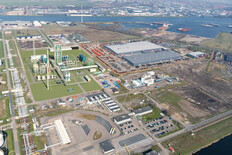- The AMA Project will produce bio-methanol from non-recyclable waste and biomass in Amsterdam.
- The plant will have a daily production capacity of 260 tons of bio-methanol.
- The estimated investment for the project is over €200 million.
- The project aims to replicate similar plants across the Netherlands, the UK, and other European countries.

Project Overview
The “Advanced Methanol Amsterdam” (AMA) Project aims to replace fossil fuels with bio-methanol produced from non-recyclable waste and biomass. Técnicas Reunidas has signed a contract with G.I.Dynamics BV (GID), an international biofuel project developer, to develop a new bio-methanol plant in Amsterdam.
Contract Details
The contract includes the execution of detailed engineering and investment estimation in the form of “open books” (FEED-OBE). The estimated investment for the project is over €200 million.
Production Capacity
The future plant will have the capacity to produce 260 tons per day of bio-methanol. The production process will involve high-temperature gasification, acid gas recovery, and methanol units.
Environmental Impact
Bio-methanol will be obtained from the gasification of non-recyclable wood waste and RDF, which will then be blended with gasoline. This process aims to substantially reduce the environmental impact of fuel.
Strategic Expansion
The Amsterdam plant is the first step in a broader strategy to contribute to transport decarbonization through waste and biomass recovery. The project plans to replicate similar plants throughout the Netherlands, the United Kingdom, and other European countries.

